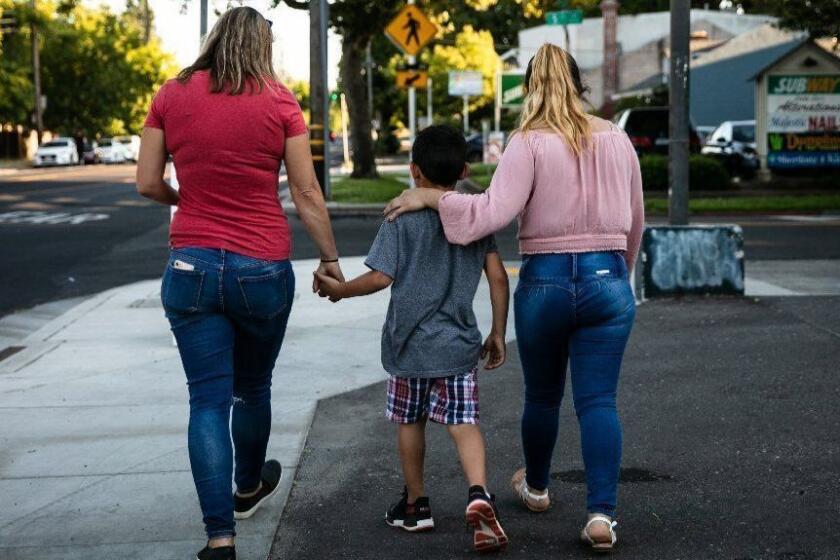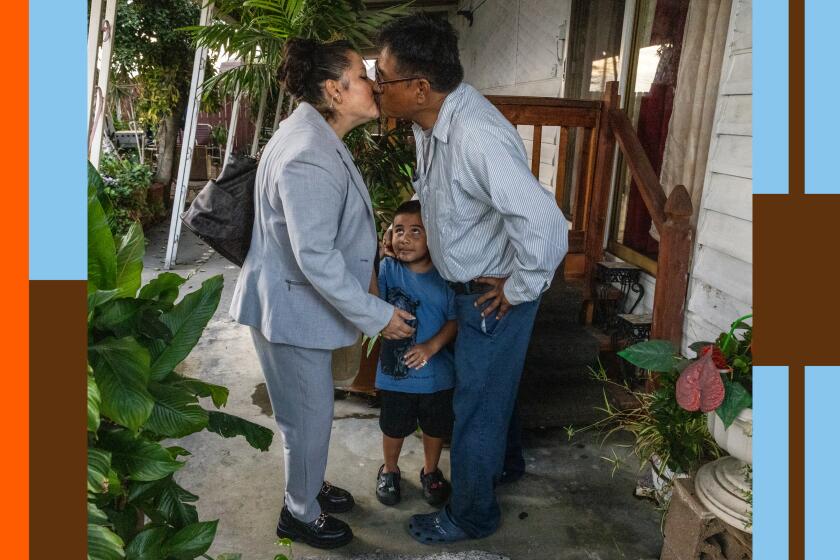
América Ramirez Lomeli, named for the Mexican soccer team, did everything right as an immigrant.
Growing up in California’s capital, she excelled in school. She volunteered, racking up more than 2,000 hours of extracurriculars by the time she graduated. She collected toys for the children’s hospital that helped her brother after he fell from a roof, and, at her mother’s command, she stayed calm when police were nearby so they did not attract unwanted attention.
For the record:
2:57 p.m. Dec. 6, 2023An earlier version of this article misstated the number of members SEIU 2015 has in California. SEIU 2015 represents more than 400,000 members in California.
Drawing on an unprecedented poll, this series tells the stories of immigrant life in America today, putting their voices in the foreground.
But none of it was enough. She didn’t have papers.
When she graduated from UC Davis with a double degree this summer, she lacked the one thing she required for success — the legal right to work.
“I wanted to help my mom, I wanted to help myself, I wanted to help others, and I couldn’t,” she said of growing up undocumented in California. “I tried not to think about it too much because I knew there was nothing I could do. It always made me feel, I don’t know how to say it in English, impotente.”
California or Texas, which is better for immigrants?
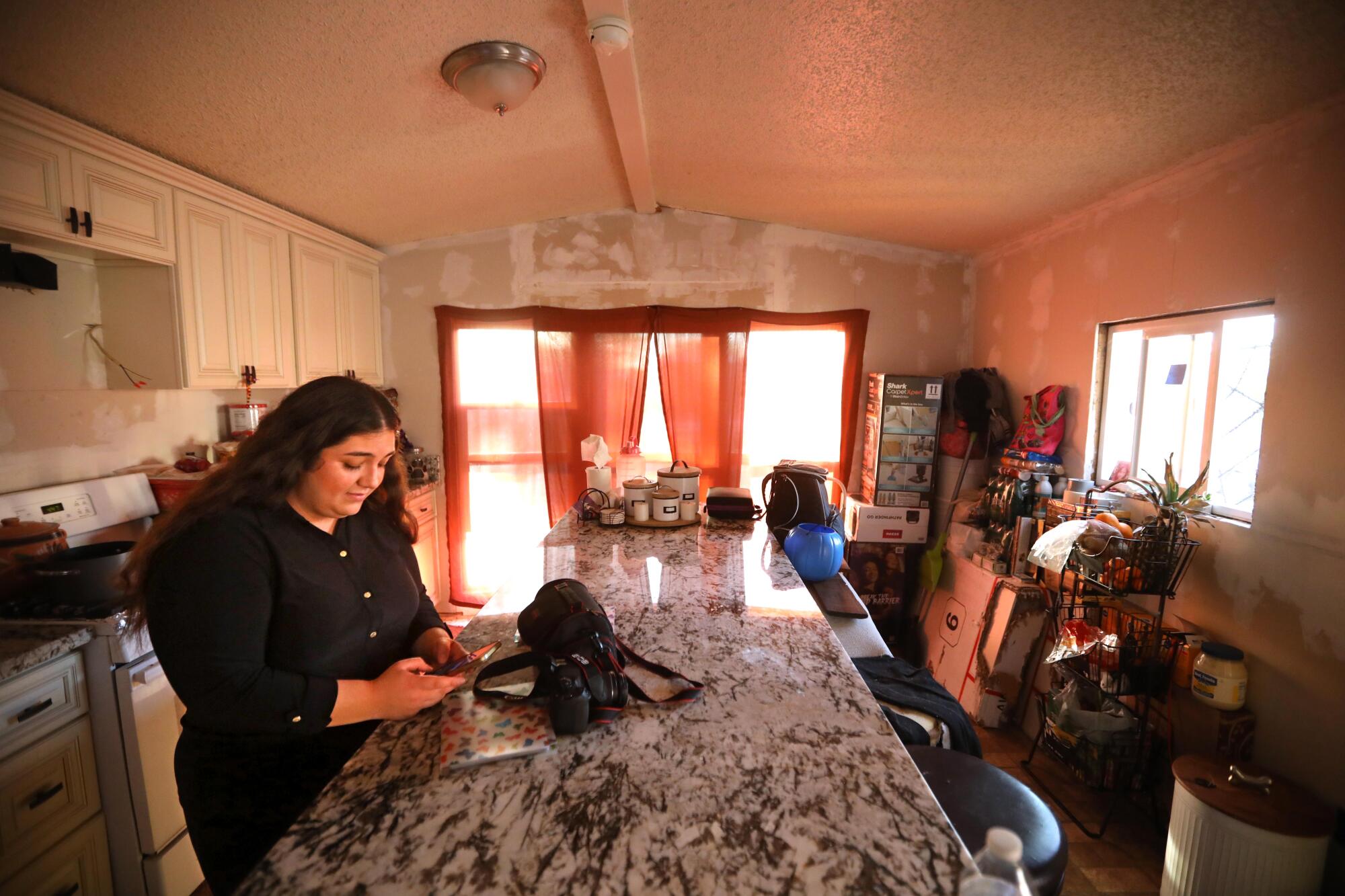
To some who did not cross a border to be here, the answer may seem obvious: California, of course.
How could it not be, with a state Assembly speaker who grew up in farmworker housing, our sanctuary cities and our many laws meant to shield, aid and uplift the vulnerable among us?
Certainly, immigrants agree that California is the more welcoming state: 7 in 10 California immigrants said most people in the state welcome immigrants; only about 4 in 10 Texas immigrants said the same, according to a wide-ranging survey of immigrants conducted by KFF and the L.A. Times earlier this year.
But, despite stark political and social differences between the Lone Star and Golden states, the hundreds of immigrants interviewed for the survey reported strikingly similar experiences — and overall satisfaction — in both places.
Immigrants reported similar levels of welcome in their neighborhoods in both states — perhaps because they live in places where other transplants have congregated, offering community and protection from outside attitudes.
We asked thousands of immigrants about their experiences and lives in this country. How would you answer those same questions?
Asked about discrimination in places such as stores and restaurants, the shares of immigrants in the two states who reported bad experiences showed little difference. The same sameness was reported when it came to discrimination in interactions with police or buying or renting a home.
Those results did not surprise Ramirez Lomeli or other immigrants I spoke with. They pointed to a larger truth about the immigrant experience in America: Federal law rules.
“California has done a lot and can do more, but we know that the immigration system needs to be reformed federally,” said Maggy Krell, a lawyer with the California Department of Justice who is running for a state Assembly seat. In her personal time, Krell has represented immigrants, including mothers separated from children by Trump-era policies.
Millions of immigrants — those here legally as well as unauthorized migrants — find their lives constrained by the complex, sometimes irrational, twists of U.S. immigration law.
Immigrants interviewed by The Times largely shrugged off as irrelevant to daily life the larger political battles that fill the news and shape voter attitudes:
Texas would like to pay for its own border wall. California would like to pay for more immigrants to have healthcare. President Biden wants pathways to citizenship. Donald Trump wants mass deportations.
But survival — paychecks, housing and schools — was far more important to immigrants themselves.
Ziria Lomeli, América’s mother, said she rarely thinks about politics or her own undocumented status because it “doesn’t affect” her.
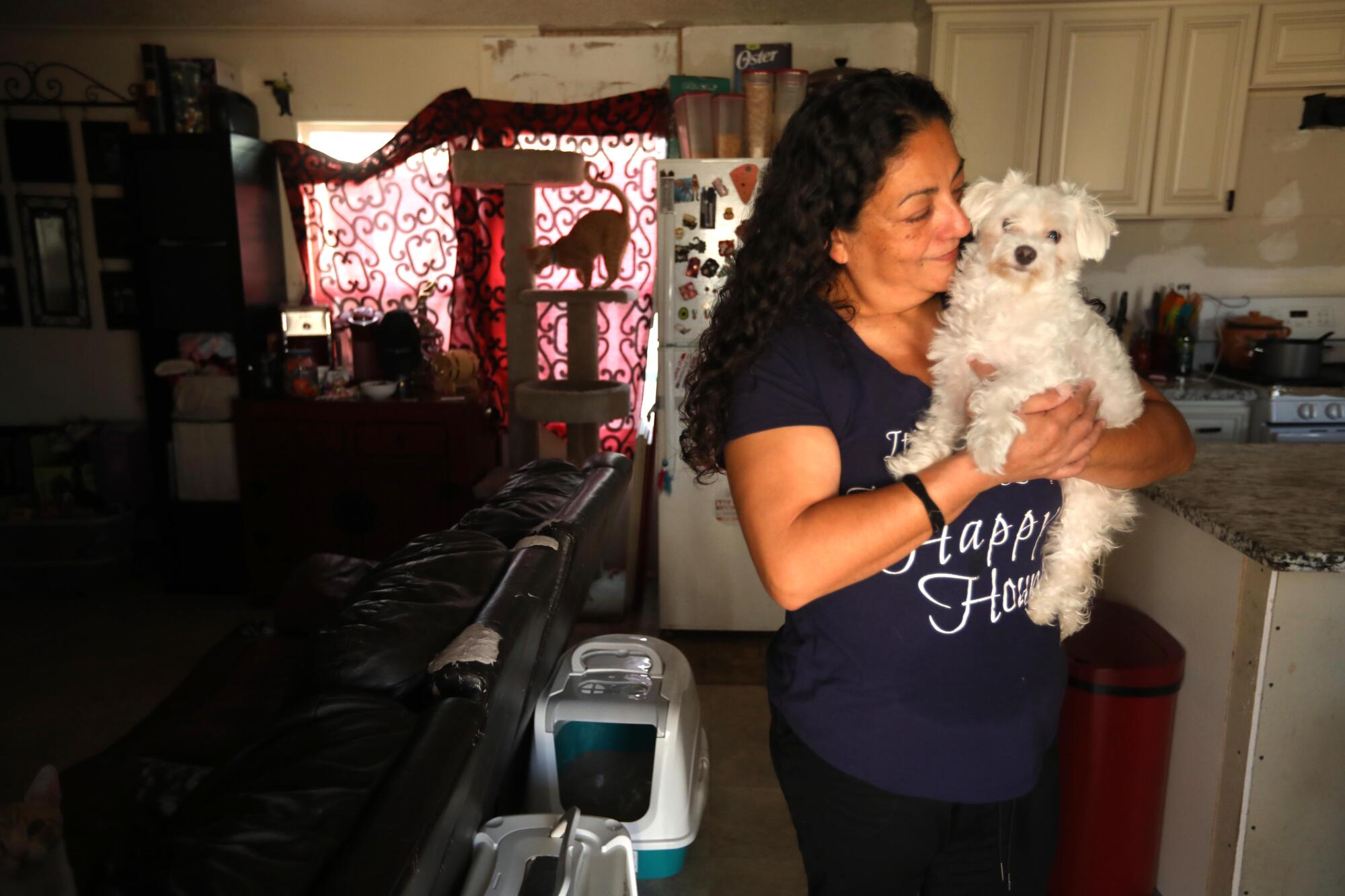
Instead, she focuses on the future for America and her two younger siblings, both of whom were born here. Although she was a kindergarten teacher for 10 years in Mexico, Lomeli now fights to pay her bills earning $150 a day on a construction crew — a job she loves but where misogyny and discrimination are common.
She regrets nothing, she said, and trusts God over government to provide for her family. She knows that in the United States, her kids will “cómete el mundo,” eat the world, when their time comes.
It is that combination of isolation and optimism that seemed to dominate immigrant attitudes in both states, a sense of purpose and commitment to family.
Like thousands of Central American parents seeking asylum in the United States, Patricia panicked when, after she and her son crossed the Rio Grande into Texas last year, U.S. border agents took the boy away.
Angel Rangel, a respondent to the poll who agreed to a follow-up interview, immigrated legally with his mother about 10 years ago when she married an architect who is a U.S. citizen. He recently received his citizenship just before graduating high school.
Growing up in El Paso, where roughly 80% of residents are Latino, he viewed poverty as a bigger factor than race when it comes to how people are treated in Texas, he said.
“I wouldn’t say it’s a good thing by any means,” Rangel told me, but “it’s more a stereotype of poor people, not people of color.”
“I barely see cases of discrimination around me, any at all,” Rangel added. “I don’t really think discrimination is a big deal.”
Blanca Trebino, another poll respondent, owns a home in McAllen, Texas, a few miles from the border. She immigrated decades ago, and if it weren’t for that house, she might move, she said.
The affordability of Texas — where the average home price is under $300,000, compared with $746,000 in California — was one factor that immigrants said made it a good place to live. More immigrants in California reported struggling to pay for housing, the poll found.
Like Rangel, Trebino sees poverty — especially for undocumented residents who have little ability to complain about working or housing conditions — as a bigger factor than racism in Texas.
She sees, though, how some state laws in Texas make the hardships of poverty worse. Not too long ago, she met an undocumented family who had run out of gas. She offered to buy them some and give them a ride, she said. But the attendant at the gas station warned her that transporting undocumented people could be considered a crime.
“The guy said, ‘Don’t do that, don’t do that,’” she said. “If you have illegals in your car, you are transporting illegals, even if the people need help.”
A first-of-its-kind survey of more than 3,300 immigrants nationwide confounds some of the conventional wisdom surrounding their politics and partisanship.
Despite the similarity in everyday experiences, real differences such as Texas’ laws on human smuggling do exist. So do undeniable benefits in California, such as laws that allowed Ramirez Lomeli to pay in-state tuition at the University of California, making college economically feasible.
A much more tightfisted healthcare system means that the share of immigrants without insurance is far higher in Texas. So, too, is the share who reported skipping or postponing healthcare services in the previous 12 months, the survey found.
Most of those interviewed for this story understood that regardless of what was happening in their neighborhood or their personal lives, state politics and attitudes mattered.
And while first-generation immigrants like Ziria Lomeli are busy enduring, their “Dreamer” — DACA recipient — and second-generation offspring are less willing to settle for less.
“I was left with the feeling that I get what I can get, and I just have to be grateful for it. Like I didn’t deserve more,” Ramirez Lomeli said. “I think for a long time I suppressed all my anger.”
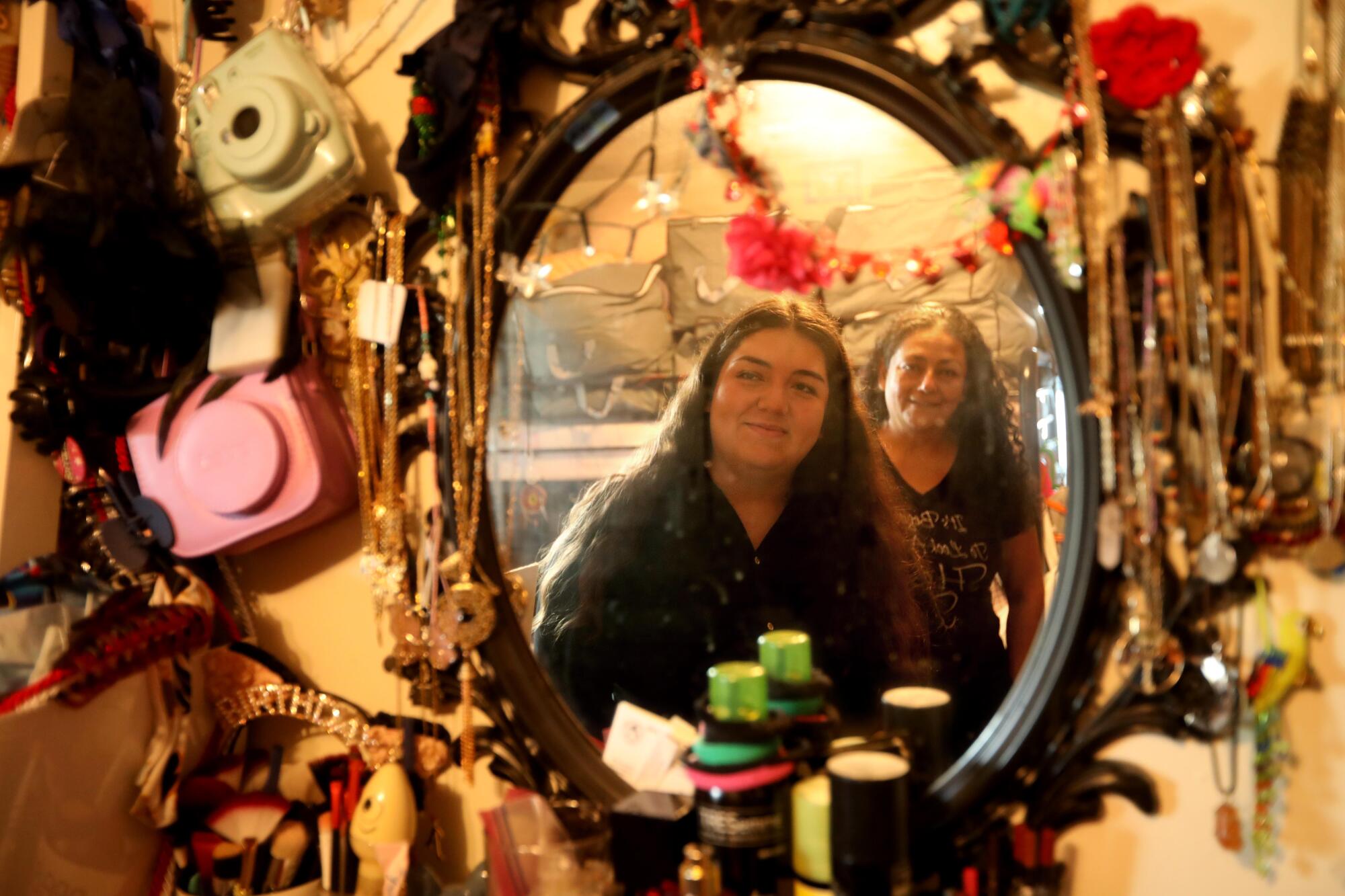
Texas state Rep. Armando Lucio Walle, who represents a diverse part of Harris County, including some of unincorporated Houston, has his own reasons to be angry. He has family on both sides of the border, and said he’s seeing change in Texas, but not for the better.
A hard-right turn in politics, mirrored at the national level, is causing fights at the statehouse and filtering into communities.
Some say the situation may soon be dramatic enough to change attitudes about everyday life.
Three bills in particular have left Texas lawmakers in bitter quarrels in recent months:
One would increase penalties for human smuggling.
Immigrants to the U.S. face extensive challenges, but they still report high levels of optimism about their futures and trust in American institutions, a comprehensive survey has found.
Another, headed to Gov. Greg Abbott’s desk, empowers law enforcement anywhere in Texas to detain and transport those suspected of illegal entry to the border for removal, even if they are not in the United States illegally.
A third measure, which recently moved forward, provides $1.5 billion for Texas to build new segments of border wall.
“Ain’t that some stuff?” asked Walle, who recently went viral after an impassioned speech on the floor of the Legislature against one of those measures. “Now Texas wants to pay for the wall. It’s funny, right?”
A few years ago, these bills wouldn’t have even gotten a hearing, Walle said. But now there is a need to “feed this beast” of conservative outrage directed at immigrants.
He compares it to what happened in the 1990s in California, when a backlash against immigration helped pass Proposition 187, a measure to deny social services to undocumented people and force teachers and health providers to report those they suspected of being undocumented. Proposition 187 passed, but was quickly stayed by courts and ruled unconstitutional a few years later.
The proposition ignited a wave of organizing by immigrant and labor groups — one that transformed California politics in ways that are fundamentally different from Texas.
The state’s labor movement, which is heavily focused on immigrants, has been another force for change in California. Unions encompass more than 2 million members in the state — far more than in Texas — and have been a pathway to social and political power for immigrants. Many California legislators have risen through the ranks of unions, and union members are the boots-on-the-ground that politicians depend on.
Blanca Carias lives in Los Angeles and is a member of SEIU 2015, which represents more than 400,000 home healthcare workers in California, most people of color and women. Carias credits the union with educating her not just about work issues, but her own power to effect broader change.
In 2012, she collected signatures to pass a law that allowed undocumented people to receive California driver’s licenses. Then-Gov. Jerry Brown signed the law in 2013, and more than a million undocumented people now hold a license.
“The union, that is where I found the encouragement to help others,” Carias said.
Whether the new round of Texas laws hostile to immigrants will spark similar organizing there remains to be seen.
The state has seen some signs of change. Houston is one of the most diverse cities in America and, with the help of the political group Texas Organizing Project, elected a progressive Black mayor, Sylvester Turner, in 2015.
In 2018, Democrat Beto O’Rourke ran a surprisingly successful campaign against Republican Ted Cruz for the U.S. Senate, losing by 2 points — closer than many thought possible since no Democrat has won statewide office in Texas since 1994.
Since then, however, Democrats’ hopes of shifting Texas to the blue column — or even purple — haven’t shown much progress. In 2020 and 2022, Republicans gained some ground among Latino voters in the state, especially in areas near the border.
Texas Democrats, still a minority and gerrymandered to stay that way, do have hope. They may find more Texans — even those who tend to skew conservative on social issues, as many immigrants do — open to arguments of inclusion as daily life grows harder under harsh laws, they predict.
“Many of us who have been here for generations, even though we are proud Americans, proud Texans, we have roots in Mexico,” Walle said. “There is a complicated history, but we all come from mixed-status families.”
Walle said it’s too late to pretend that Texas, like California, isn’t a state of immigrants. Further attempts to do so will only fuel a fight that has already been decided in California.
Walle and Ramirez Lomeli agree on this: Immigrants in both states still have far to go.
In recent weeks, with the help of a lawyer, Ramirez Lomeli was able to obtain a federal work permit. She landed a job as a policy advocate for female farmworkers.
When her first paycheck came, she bought groceries for her family, but didn’t know what to do with the rest. She said maybe she’ll save up for law school.
Like so many Californian immigrants, she doesn’t just want to make this state better. She wants to make America better, for those who will follow hope across the border, as her mother did, and those who were born here — like her sister and brother.
And if that means fighting the big fights, even on behalf of those who don’t see their importance, she is willing. Ella está lista para comerse el mundo.
“You have to truly believe in yourself even when it truly gets so hard, even when you truly feel so broken, even when it seems like the system is against you,” she said.
Here’s how the Los Angeles Times/KFF poll of American immigrants was conducted.
Start your day right
Sign up for Essential California for news, features and recommendations from the L.A. Times and beyond in your inbox six days a week.
You may occasionally receive promotional content from the Los Angeles Times.



